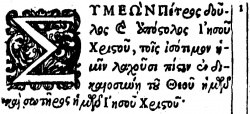2 Peter 1:1
From Textus Receptus
- ΠΕΤΡΟΥ Β΄ 1:1 ΣΥΜΕΩʹΝ Πέτρος δοῦλος καὶ ἀπόστολος Ἰησοῦ Χριστοῦ, τοῖς ἰσότιμον ἡμῖν λαχοῦσι πίστιν ἐν δικαιοσύνῃ τοῦ θεοῦ ἡμῶν καὶ σωτῆρος ἡμῶν Ἰησοῦ Χριστοῦ•
(Textus Receptus, Novum Testamentum, Theodore Beza, 5th major edition. Geneva. 1598)
- 2 Peter 1:1 Simon Peter, a servant and an apostle of Jesus Christ, to them that have obtained like precious faith with us through the righteousness of God and our Saviour Jesus Christ:
(King James Version, Pure Cambridge Edition 1900)
- 2 Peter 1:1 Simon Peter, a servant and an apostle of Jesus Christ, to those who have obtained like precious faith with us through the righteousness of God and our Saviour Jesus Christ:
(Progressive King James Version)

Contents |
Interlinear
Commentary
The Granville Sharp Rule
The KJV has been accused of being misleading by bible critics such as Dan Wallace and James White. The claim that The Granville Sharp Rule reveals the KJV to be in error here.
This verse is simply placing emphasis upon the fact that Jesus will return as the "great God" for all mankind but also "our savior" for the Christians. To those unfamiliar with The Granville Sharp Rule, let me simply demonstrate with a few examples the error of the claims of modern scholars to save you wasting your time reading their nonsense.
Galatians 1:4 reads: Who gave himself for our sins, that he might deliver us from this present evil world, according to the will of God and our Father." Thessalonians 1:3 we read, "Remembering without ceasing your work of faith, and labour of love, and patience of hope in our Lord Jesus Christ, in the sight of God and our Father."
In these passages it is clearly demonsratated that God and Father are the same Person. The nouns God and Father are separated to explain two characteristics; that God who is all powerful, Almighty, is also our Father, emphasizing the care of a Father.
The Greek phrase σωτῆρος ἡμῶν (sotayros eemoon) means "our savior" in Titus 1:3, 4; 2:10, 2:13; 3:4, 6 and is consistent throughout the KJV.
James White in his zeal to seem pro Trinitarian, swallows most of Dan Wallace's teachings, and is happy to change certain KJV readings to appeal to an illiterate or unregenerate mindset. Any Christian who reads the bible faithfully will accept the doctrine of the Trinity, and because certain people are illiterate or twist the Scripture to suit their own doctrine, that does not warrant the bible to be changed. The KJV clearly speaks of two aspects of the one Christ. The only issue is with James White's understanding of English.
James White says:
- The construction here is *identical* to the construction found in 1:1, with only one word being different. Here are the passages as they are transliterated into English:
- 1:1: tou theou hemon kai sotaros Iesou Christou
- 1:11: tou kuriou hemon kai sotaros Iesou Christou
- Notice the exact one-to-one correspondence between these passages! The only difference is the substitution of "kuriou" for "theou". No one would question the translation of "our Lord and Savior, Jesus Christ" at 1:11; why question the translation of "our God and Savior, Jesus Christ" at 1:1? Consistency in translation demands that we not allow our personal prejudices to interfere with our rendering of God's Word.[1]
Here we have a clear example of the flawed scholarship of James White. Beza's 1598 Greek clearly has an additional ἡμῶν before Jesus Christ. One could excuse James if he was quoting the text of Scrivener and didn't check Beza, as there are about 191 differences, but he failed totally and quoted the text of Stephanus. James White erroneously thinks that his choice of Greek text was that underlying the KJV. So James has written books on the topic of King James Onlyism, but cannot tell which Greek text underlies the KJV? James proudly held up an original of the Stephanus' 1550 Editio Regia (the third edition of the Greek New Testament of Robert Estienne) at a debate against Jack Mormon in 2011, but seems to hold books up in the air, without knowing much about their contents or translations.
- 1550 τοῦ θεοῦ ἡμῶν καὶ σωτῆρος ---- Ἰησοῦ Χριστοῦ (Stephanus)
- 1598 τοῦ θεοῦ ἡμῶν καὶ σωτῆρος ἡμῶν Ἰησοῦ Χριστοῦ (Beza)
- 1880 τοῦ Θεοῦ ἡμῶν καὶ σωτῆρος ἡμῶν Ἰησοῦ Χριστοῦ· (Scrivener)
Even a basic cursory look at English versions actually based upon the 1550 text, would show these differences, or at least generate some curiosity in James as to why there was a difference.
- 1535 of oure God, and Sauioure Iesus Christ. (Coverdale Bible) - Stephanus based
- 1560 of our God and Sauiour Iesus Christ: (Geneva Bible) - Stephanus based
- 1611 of God and our Saviour Jesus Christ: (King James Version) - Beza based
One can debate the inclusion of ἡμῶν and the reasons why Beza included it in his editions, but one cannot escape the White's lack of knowledge on this topic.
Liberal Scholar Bruce Metzger said concerning the addition of ἡμῶν:
- Accompanied by annotations and his own Latin version, as well as Jerome's Latin Vulgate, these editions (of Beza's text from 1565, 1582, 1589, and 1598) contained a certain amount of textual information drawn from several Greek manuscripts which Beza had collated himself, as well as the Greek manuscripts collated by Henry Stephanus, son of Robert Stephanus. [1]
References
- 1. Metzger, The Text Of The New Testament, 105.
